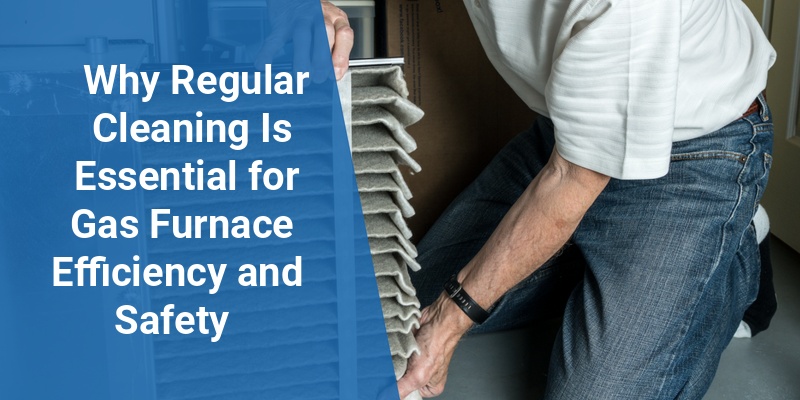Gas furnaces are a common heating source in many American homes, providing reliable warmth during cold months. However, many homeowners wonder, does a gas furnace need to be cleaned, and if so, why? Regular cleaning and maintenance of a gas furnace are crucial for ensuring optimal performance, energy efficiency, and safety. Neglecting furnace cleaning can lead to increased energy bills, system malfunctions, or even hazardous conditions like carbon monoxide leaks.
| Aspect | Importance | Recommended Frequency |
|---|---|---|
| Cleaning Furnace Components | Prevents dust buildup, improves airflow, boosts efficiency | Annually |
| Checking Gas Connections | Ensures safety, prevents leaks | Annually or if issues arise |
| Inspecting and Replacing Filters | Maintains air quality, prevents system strain | Every 1-3 months |
| Professional Furnace Inspection | Comprehensive safety and performance check | Annually before heating season |
Why Cleaning a Gas Furnace Is Vital
A gas furnace burns fuel to generate heat, which means it requires a clean environment to operate efficiently. Dust and debris accumulation can clog the system, reducing airflow and forcing the furnace to work harder. This strain increases energy consumption and utility costs, while also raising the risk of mechanical breakdowns.
Moreover, a dirty furnace can cause incomplete combustion, potentially releasing dangerous carbon monoxide gases into the home. Regular cleaning ensures all components are free from dust and obstructions that could impair the burner or heat exchanger.
Key Components of a Gas Furnace That Require Cleaning
- Air Filter: Traps dust and contaminants; dirty filters reduce airflow and efficiency.
- Burner Assembly: Accumulated soot or dirt can affect combustion quality and safety.
- Blower Motor and Fan: Dust buildup causes strain and decreases air circulation.
- Heat Exchanger: Critical for transferring heat; dirt or corrosion can cause cracks, leading to safety hazards.
- Flue or Vent Pipe: Needs to be clear to exhaust combustion gases properly.
Signs Your Gas Furnace Needs Cleaning
It is important to recognize when your furnace requires attention. Common signs include:
- Reduced heating efficiency or uneven heating throughout the home.
- Unusually high energy bills without increased usage.
- Frequent cycling on and off, indicating system strain.
- Visible dust, soot, or debris around the furnace or vents.
- Unusual odors, including a burning smell or gas scent.
- Yellow burner flames,
The Recommended Cleaning and Maintenance Schedule
Adhering to a regular cleaning schedule keeps your gas furnace in top condition and extends its lifespan:
| Maintenance Task | Frequency |
|---|---|
| Replace or clean air filters | Every 1 to 3 months |
| Clean and inspect burners and heat exchanger | Annually before heating season |
| Clean blower motor and fan | Annually |
| Inspect flue and vent pipes for blockages | Annually |
| Professional furnace inspection and tune-up | Annually |
Benefits of Professional Gas Furnace Cleaning
While some maintenance tasks like filter replacement can be done by homeowners, a professional cleaning and inspection is highly recommended annually. HVAC technicians have the expertise to:
- Safely clean internal furnace components.
- Check for gas leaks and carbon monoxide risks.
- Identify worn parts that require replacement.
- Optimize combustion and airflow for maximum efficiency.
- Improve indoor air quality by removing dust and mold buildup.
This thorough approach not only improves furnace performance but also enhances safety and reduces chances of costly emergency repairs.
Call 888-906-9139 for Free Local HVAC Quotes – No Obligation, Just Savings!
How Neglecting Gas Furnace Cleaning Can Impact Your Home
Failing to maintain a gas furnace can have multiple negative impacts:
- Higher energy costs: A dirty furnace works harder, consuming more fuel.
- Reduced comfort: Uneven or insufficient heating can affect room temperature.
- Shortened equipment life: Strain on parts increases wear and tear.
- Increased risk of breakdowns: Dirt may cause mechanical failures or system shutdowns.
- Safety hazards: Carbon monoxide leaks and fire risks increase without proper cleaning.
DIY Tips for Maintaining Your Gas Furnace Between Professional Cleanings
Homeowners can take simple steps to keep their furnaces running smoothly:
- Change air filters regularly: Follow the manufacturer’s guidelines, typically every 1-3 months depending on usage.
- Keep the area around the furnace clean: Remove dust, clutter, and combustible materials.
- Inspect vents and registers: Ensure they are open and unblocked for proper airflow.
- Listen for unusual noises: This may indicate dirt buildup or mechanical issues.
- Test carbon monoxide detectors: Ensure safety devices are functioning properly year-round.
Understanding the Cost and Value of Gas Furnace Cleaning
Investing in regular gas furnace cleaning is cost-effective in the long term. According to industry experts, an annual professional cleaning typically costs between $100 and $300, depending on location and furnace complexity. This cost pales in comparison to the expenses of higher energy bills, emergency repairs, or premature furnace replacement.
Maintaining a clean, efficient furnace lowers fuel consumption, improves home comfort, and prioritizes family safety, making it a valuable annual expense.
How to Choose a Reliable HVAC Service for Gas Furnace Cleaning
Selecting a qualified professional can maximize the benefits of furnace maintenance. Look for HVAC companies that:
- Are licensed, insured, and certified.
- Have positive customer reviews and local reputation.
- Offer comprehensive furnace cleaning and inspection services.
- Provide clear cost estimates and service warranties.
- Employ experienced technicians trained in gas furnace systems and safety protocols.
Proper professional maintenance ensures thorough cleaning and peace of mind.
